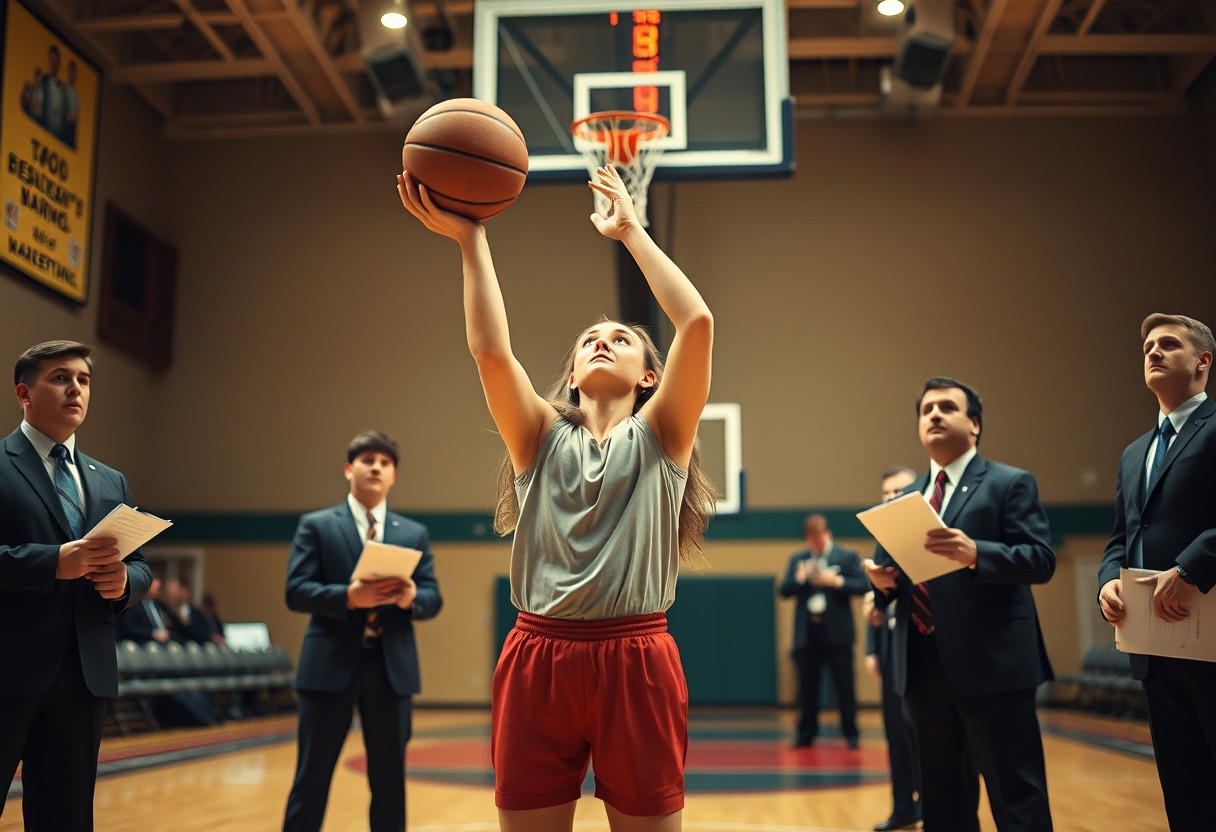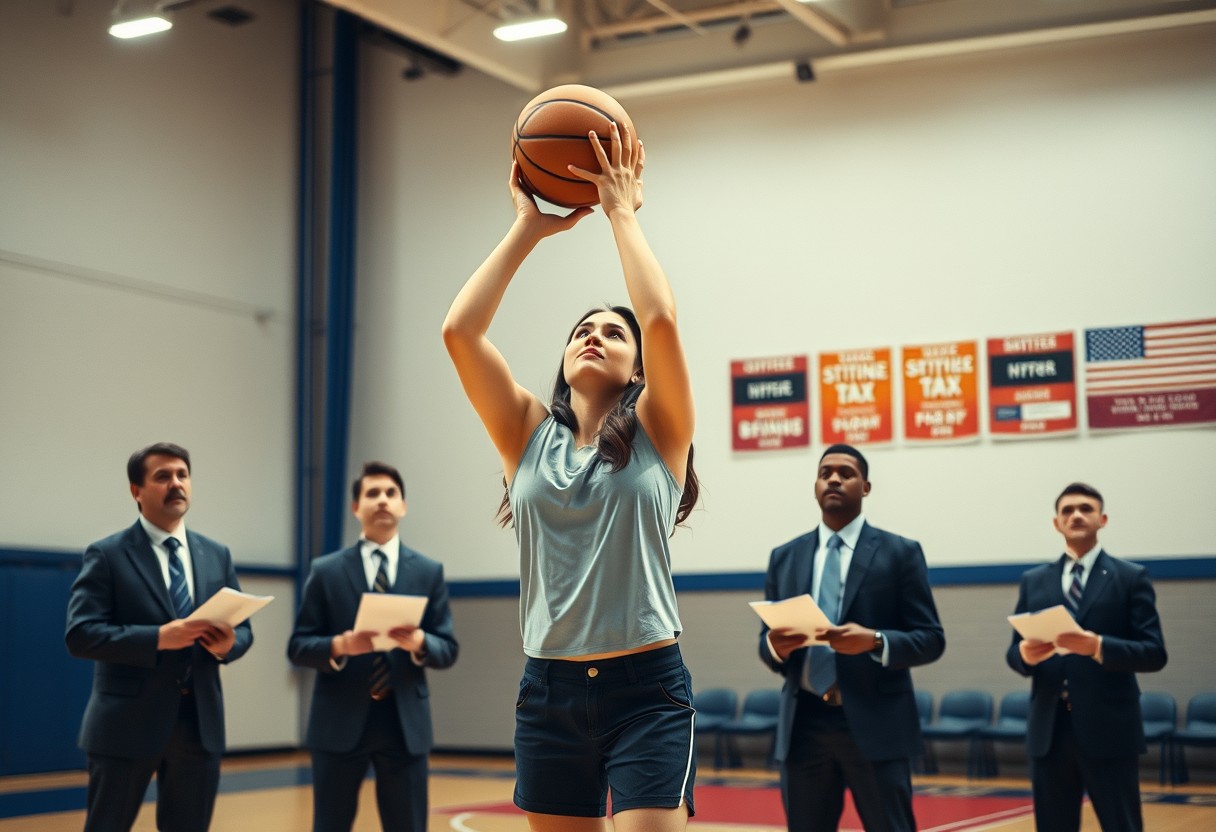Audience members seeking insights into the financial implications of athletic success may find Caitlin Clark’s rise in the sports arena particularly noteworthy. As she garners attention for her exceptional skills on the court, state tax departments are also viewing her success through a different lens. They are assessing potential tax obligations and revenue generated from the significant increase in endorsements and sponsorships associated with her popularity. This blog post explores the intersection between Clark’s achievements and the fiscal responsibilities that arise for both her and the jurisdictions involved.
Key Takeaways:
- Tax Implications: Caitlin Clark’s high-profile status brings attention to the tax obligations of athletes and influencers, particularly regarding income earned through endorsements.
- State Regulations: Different state tax laws can affect how much an athlete is taxed, highlighting the importance of understanding local regulations.
- Impact on Compliance: Increased visibility can lead to greater scrutiny from tax departments, necessitating strict compliance with tax regulations to avoid penalties.
- Cross-State Concerns: Athletes like Clark who compete in various states may encounter multiple state tax obligations, complicating their tax filings.
- Financial Advisors: The role of financial advisors and tax professionals becomes even more vital for managing the tax implications of a public figure’s earnings.
- Public Awareness: Caitlin Clark’s situation raises awareness about the financial responsibilities athletes face, including how they manage taxes on income from different sources.
- Future Legislation: Increased focus on athletes may lead to legislative changes aimed at simplifying or clarifying tax obligations for public figures.
The Emergence of Caitlin Clark
Before stepping into the spotlight of women’s basketball, Caitlin Clark was molded by her early life and familial influences. Growing up in West Des Moines, Iowa, she was surrounded by a supportive family that fostered her passion for sports. Her father, a former athlete himself, introduced her to basketball at a young age, igniting a spark that would grow into an impressive talent. It wasn’t long before her skill became evident, as she began dominating local competitions and drew attention for her distinctive play style. (She ultimately made the important decision to pursue basketball dedicatedly during her middle school years.)
Early Life and Basketball Beginnings
Basketball became Caitlin Clark’s main focus as she continued her athletic journey through high school. She not only excelled at her game but also broke records on her way to becoming a prominent figure in women’s basketball. Throughout her high school career at Dowling Catholic High School, Caitlin garnered numerous accolades, including multiple awards and recognition as a top player in the state. Her relentless drive and outstanding talent set her apart, leading her to be heavily recruited by elite collegiate programs.
College Career Highlights
Emergence onto the collegiate scene saw Caitlin Clark executing her remarkable skills at the University of Iowa. She quickly established herself as a dominant force in women’s college basketball. With extraordinary statistics, including averaging over 27 points per game in her sophomore year, she ranked among the best players in NCAA history. Caitlin’s contributions led to multiple All-American selections and she broke several game and season records, including an impressive number of three-pointers made. Her electric style of play earned her accolades that showcased her as a phenomenon in the sport.
The journey of Caitlin Clark continues to inspire many, as she has cemented her legacy as one of the standout players in college basketball. Her ability to deliver under pressure and her exceptional ball-handling skills have garnered her not only individual accolades but also team achievements, including leading her Iowa team deep into the NCAA tournament. The combination of her profound impact on the game and her fierce competitive spirit positions her as a key athlete to watch in the future of women’s sports.
The Financial Impact of Celebrity Athletes
Assuming that the rise of celebrity athletes significantly influences local economies, it becomes evident that figures like Caitlin Clark have far-reaching implications beyond the scoreboard. As highlighted in various analyses, including Caitlin Clark’s impact on college women’s basketball, her fame can attract considerable attention from various brands, creating a ripple effect within the financial landscape. This phenomenon can lead to substantial taxable income generated for state revenue through endorsements and sponsorships.
Revenue Generation from Endorsements
Celebrity athletes often become prime targets for big-name endorsements and sponsorship deals, significantly elevating their taxable income. Caitlin Clark, with her exceptional skills and burgeoning popularity, is no exception. Brands seeking to tap into the enthusiastic fan base surrounding her can create lucrative sponsorship opportunities that not only enhance their visibility but also contribute to state revenues through taxation on these earnings. In addition, her esteemed position in college women’s basketball positions her well to attract both national and local brands aiming to resonate with younger demographics.
Increased Attendance and Merchandise Sales
Generation of interest from athletes of Clark’s stature leads to increased attendance at games and a sharp rise in merchandise sales. The excitement surrounding her performances not only fills stadiums but also drives sales of branded merchandise, further reinforcing local economies through sales taxes. This influx in attendance not only benefits the university finances but also has significant positive impacts on nearby businesses, ranging from hotels to restaurants that thrive during game days. (This pattern underscores the potential for policy decisions that can further incentivize investment in women’s sports.)
In fact, attendance at games featuring high-profile athletes like Clark can lead to substantial financial gains for local communities through the increased sales of food, beverages, and other game-day merchandise. Overall, the visibility and success of athletes like her not only foster a sense of community but also engender financial growth, benefiting both state and local economies. (The ripple effect emphasizes the importance of supporting initiatives aimed at promoting women’s sports.)

State Tax Implications for Athletes
Not every athlete is aware of the tax implications stemming from their performances on the court or field. State tax departments diligently track player earnings, and professional athletes, including rising superstars like Caitlin Clark, must navigate a complex landscape of tax obligations. Each state where they compete may have its own set of regulations governing income taxation, along with sales tax considerations that affect not only prize winnings but also endorsements and merchandise sales.
Overview of State Tax Regulations
For athletes who earn income from various sources, understanding state tax laws is vital. States typically impose income tax on earnings accrued within their borders, meaning that athletes who play in multiple states may be subjected to taxes in those jurisdictions. This can lead to a situation where they owe income tax to several states, complicating their financial planning. In addition, sales tax may apply to merchandise sales, event tickets, or endorsement deals, further affecting overall earnings. Players like Caitlin Clark must be well-informed about these regulations to manage their financial responsibilities effectively.
The Role of Tax Treaties in Multiplicity of Taxes
For athletes who participate in competitions across state lines, the complexities of taxation can expand significantly. Tax treaties between states can mitigate these burdens by providing guidelines to avoid double taxation, ensuring that athletes are not penalized financially for representing their team in various locations. For example, if Caitlin Clark plays in California but also competes in a tournament in New York, she may be liable for income tax in both states. However, tax treaties might allow her to receive credit for taxes paid to one state when filing in the other, alleviating some financial stress. (An important decision regarding this aspect was made in the case of Major League Baseball Players Association v. Commission of Revenue.)
Overview, tax treaties are designed to simplify the tax landscape for athletes facing the unique challenge of earnings accrued in multiple jurisdictions. These agreements clarify how state taxes are levied and ensure that players like Caitlin Clark are not overly burdened by conflicting state laws. Such treaties often contain provisions that allow athletes to offset taxes paid in one state against taxes owed in another, ensuring they are not taxed more than once on the same income. (A landmark decision in this context was established in the 2021 ruling involving the taxation rights of professional athletes.)
As players gain popularity and recognition, it is imperative for them to consult professionals who can provide guidance on state tax laws and ensure compliance. The nature of their work means income taxes will continue to play a pivotal role in their financial landscape, and they must be equipped to handle these challenges effectively.

Caitlin Clark’s Unique Positioning
Keep in mind that Caitlin Clark’s philanthropic endeavors significantly contribute to her financial landscape. As she engages in various charitable contributions, these actions not only benefit the communities she supports but also influence her tax liabilities. Donations to qualifying nonprofit organizations can potentially yield tax deductions, thus providing a financial advantage to Clark while impacting state tax revenue. This dynamic creates a relationship between her generosity and the state treasury, underscoring the importance of charitable actions for public funding. (Recent legislation has encouraged individuals to donate more than ever and claim deductions.)
Charitable Contributions and Tax Deductions
After examining Caitlin Clark’s extensive outreach through charitable contributions, it’s evident that her endeavors go beyond personal altruism; they directly affect the financial landscape of her state. By supporting various causes, she not only fosters goodwill among her fan base but also manages her tax obligations effectively. The resulting tax deductions from these contributions can lead to a reduced taxable income, benefiting both her and the state by potentially encouraging similar philanthropic efforts among her peers. (Upcoming tax reforms may further influence individual giving patterns.)
Impacts of NIL Rights
Between the implications of Name, Image, and Likeness (NIL) rights, Caitlin Clark finds herself at the forefront of a rapidly changing financial environment for student-athletes. This new paradigm allows her to monetize her popularity, enhancing her overall financial standing. While she benefits significantly from endorsements and partnerships — leading to direct financial gain — these revenues can also introduce complexities in her tax situation. Both state and federal levels assess income received from NIL contracts, which may require careful navigation of tax obligations and reporting requirements. (A recent court ruling clarified how NIL income is taxed, impacting athletes nationwide.)
Clark’s strategic approach to managing her NIL rights may present greater financial opportunities but also necessitates a keen understanding of tax implications. As she collaborates with brands and leverages her name recognition, she must remain aware of not only the immediate financial benefits but also the long-term effects these earnings may have on her state tax contributions and personal tax liabilities. (Tax advisors are increasingly being consulted by student-athletes to better understand their financial responsibilities.)
Case Studies
Once again, it is important to analyze how college athletes are impacted by state tax departments, particularly in comparison to Caitlin Clark’s situation. The complexities of taxation and ancillary financial concerns have been illuminated through various case studies that exemplify similar situations. These examples highlight the need for clarity surrounding tax obligations for student-athletes and the rich implications these can have on their financial future.
- Player A – Basketball, State Tax: California
– Earned $250,000 in NIL deals
– Paid approximately $20,000 in state taxes
– Resulted in an overall tax burden of 8% - Player B – Football, State Tax: Texas
– Earned $500,000 through endorsements
– Owed $15,000 in state taxes
– Optimal tax burden due to Texas having no state income tax - Player C – Soccer, State Tax: New York
– Received $300,000 from sponsorship agreements
– Tax obligation of $25,000 due to high state tax rates (8.9%) - Player D – Swimming, State Tax: Florida
– Generated $150,000 from various NIL contracts
– No state income tax, thus no state tax burden
Comparison with Other College Athletes
Below, a set of data outlines various college athletes facing significant tax implications while attempting to maximize their earning potential through endorsements. This contextualizes Caitlin Clark’s landscape in a wider framework, emphasizing the economic realities they confront. While Clark navigates her tax obligations within Iowa, these other athletes engage with diverse state tax regulations, multiplying the complexity facing student-athletes in these financial waters.
Case Study Table of College Athletes and Tax Obligations
| Player | State Tax Obligation |
|---|---|
| Player A | $20,000 (California) |
| Player B | $15,000 (Texas) |
| Player C | $25,000 (New York) |
| Player D | $0 (Florida) |
Analysis of Public Perception and Campaigns
Analysis reveals how the publicity surrounding Caitlin Clark not only impacts her personal financial decisions but also shapes the public’s perception of tax policies affecting student-athletes. As her story gains traction, discussions surrounding potential reform within state legislatures come to the forefront, prompting both advocacy for fair tax treatment and potential changes to taxation laws. The visibility of Clark’s situation ensures that these debates remain relevant while influencing decision-makers and stakeholders in the education and sporting arenas. (Advocacy for tax reform for student-athletes is gaining momentum.).
The public’s response to Caitlin Clark’s high-profile endorsements and subsequent tax implications illustrates a shifting sentiment regarding the treatment of student-athletes in the arena of financial obligations. They are navigating challenges unique to their position, drawing the attention of legislators who may consider revisiting existing laws related to taxation on student-athletes. The growing awareness is indicative of a more audience-conscious legislative approach. (Legislative proposals aiming to standardize tax handling for student-athletes are in review.)
Public scrutiny of tax policies concerning high-profile athletes encourages discourse around fairness and representation. They are leveraging their fame not only for financial gain but also to catalyze reform that could benefit future generations of college athletes. As Caitlin Clark serves as a prominent case study, her narrative may embolden others to advocate for sweeping changes that could lead to a more equitable landscape for all student-athletes. (Future legislative action could redefine the taxation landscape for student-athletes.)

Future Trends and Predictions
Despite the excitement surrounding Caitlin Clark’s rising fame, state tax departments are increasingly looking closely at the finances of celebrity athletes. With the spotlight on her performances and endorsements, tax authorities may escalate their audits and investigations concerning the income of athletes like Clark. The implications of this heightened scrutiny could be significant, as she and others navigate the intricacies of state tax laws and their potential liabilities. This growing focus is evidenced by discussions on platforms like Tax Foundation – When Caitlin Clark and Angel Reese …, which highlight the intersection of sports stardom and tax obligation.
Increased Scrutiny from Tax Departments
Between the allure of athletic fame and the complexities of personal finance, state tax departments are likely to ramp up their scrutiny of celebrity athletes. This increased attention may stem from a broader trend toward monitoring the income streams of athletes who often have multifaceted revenue sources, including sponsorships, appearances, and merchandise sales. As Clark’s prominence grows, the audits may become more frequent and detailed, leading to potential investigations that could result in significant financial implications for her and her peers. (Recent rulings by certain states indicate a willingness to pursue more extensive audits on high-profile athletes.)
Legislative Changes in Response to Athlete Taxation
Among the anticipated changes in legislation regarding athlete taxation are adjustments designed to clarify tax obligations for emerging stars like Caitlin Clark. With legislators increasingly aware of the unique financial situations faced by athletes, they may propose new laws that provide more transparent guidelines on income reporting and residency status. This shift could ensure that athletes are better equipped to handle their tax responsibilities, potentially mitigating disputes with state revenue agencies. (Legislative committees in various states have already begun reviewing proposals related to athlete taxation.)
Also, it is important to recognize that these legislative changes may have a ripple effect on how other states approach athlete taxation. As lawmakers work to craft comprehensive policies that consider the financial realities of professional and amateur athletes alike, the outcome could set precedents for tax treatment in the sports industry as a whole. (State legislators have emphasized the need to address the taxation of both in-state and out-of-state athletes as the landscape evolves.)
Summing up
From above, it is evident that Caitlin Clark’s influence extends beyond the basketball court, reaching into state tax departments. She represents a growing trend where athletes are recognized not only for their sports achievements but also for the financial implications their activities have on local economies. As state tax departments analyze revenue generated from events such as games, merchandise sales, and increased tourism, they benefit from the visibility that prominent athletes like Clark bring. Her performances generate substantial tax revenue that plays a vital role in funding community services and infrastructure.
Additionally, they also bring attention to the importance of compliance in tax-related matters for athletes and stakeholders within the sports industry. Clark’s rising profile amplifies the need for proper reporting and tax strategies, particularly as athletes navigate earnings from endorsements and public appearances. As a cherished figure in the sports world, she serves as an example for both aspiring athletes and the organizations that support them. Understanding the financial landscape surrounding celebrity athletes allows tax departments to better manage regulations and educate others about the economic impact of such personalities.
FAQ
Q: What is the significance of Caitlin Clark’s influence on state tax departments?
A: Caitlin Clark’s influence extends beyond the basketball court as her popularity resonates with various demographics, drawing attention from state tax departments. These departments recognize her impact as a public figure and use her appeal to promote tax education and awareness among young audiences.
Q: How can state tax departments leverage Caitlin Clark’s popularity?
A: State tax departments can engage Caitlin Clark as a spokesperson for tax-related campaigns or educational initiatives. By doing this, they can harness her appeal to reach younger taxpayers, ultimately promoting better understanding and compliance regarding state tax regulations and obligations.
Q: In what ways can Caitlin Clark contribute to tax education initiatives?
A: Caitlin Clark can participate in workshops, social media campaigns, or public service announcements focused on tax education. Her involvement can help simplify complex tax topics, making them more relatable and engaging for the audience, especially students and young athletes.
Q: What type of content can state tax departments create with Caitlin Clark’s input?
A: State tax departments can collaborate with Caitlin Clark to develop content such as video tutorials, infographics, or interactive webinars that address common tax questions, tips for filing taxes effectively, and understanding credits or deductions that might benefit young taxpayers.
Q: How might Caitlin Clark’s endorsements affect public perception of tax departments?
A: By associating with Caitlin Clark, state tax departments may benefit from a more positive public perception. Her endorsements can convey that tax departments are approachable, relatable, and focused on the needs of younger taxpayers, thereby fostering trust and encouraging engagement.
Q: Are there any potential drawbacks to involving Caitlin Clark in tax initiatives?
A: One potential drawback could be the risk of misalignment between her values and the message that tax departments aim to communicate. Additionally, public figures face scrutiny; any negative publicity surrounding Clark could inadvertently affect the perception of the initiatives she supports.
Q: What types of events could state tax departments organize featuring Caitlin Clark?
A: State tax departments could host community events, tax seminars, or money management workshops featuring Caitlin Clark as a keynote speaker. These events could focus on financial literacy, the importance of timely tax filing, and utilizing tax benefits for education and careers, all while appealing to Clark’s audience.



















